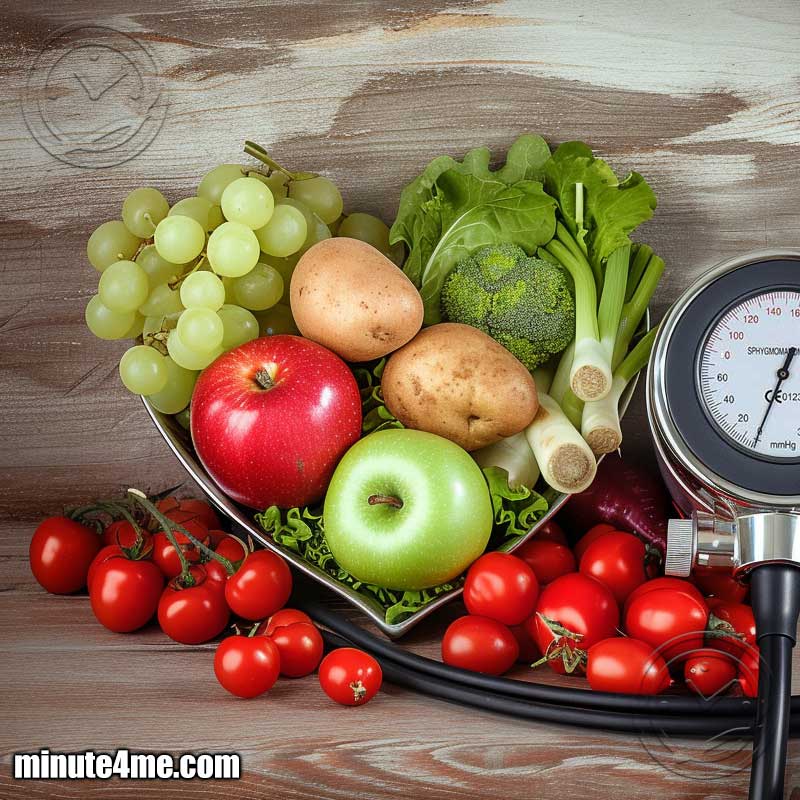Introduction to DASH Diet
The DASH diet represents a paradigm shift in nutritional approaches to combat hypertension, a condition that affects millions worldwide.
Developed through meticulous research, this diet transcends the traditional restrictions of dieting, offering a lifeline to those battling high blood pressure.
It’s a holistic approach that emphasizes the consumption of a variety of nutrients essential for heart health.
The DASH diet’s foundation is built on increasing the intake of fruits, vegetables, whole grains, and low-fat dairy products, while moderating the consumption of sodium, fats, and red meat.
This nutritional strategy not only targets hypertension but also fosters an overall improvement in health, making it a viable option for anyone looking to enhance their dietary habits.
DASH Diet and High Blood Pressure Control
Hypertension, often dubbed the “silent killer,” lays the groundwork for serious health complications, including heart disease, stroke, and kidney failure.
The DASH diet directly addresses this pervasive health issue by promoting dietary patterns that have been scientifically proven to lower blood pressure.
It operates on the principle that certain foods can bolster heart health by providing nutrients that combat hypertension.
Studies consistently demonstrate that the DASH diet can lead to significant reductions in both systolic and diastolic blood pressure.
The diet’s effectiveness is attributed to its rich content of potassium, magnesium, and fiber, along with a lower intake of sodium, which collectively work to decrease blood pressure.
6 Simple DASH Diet Dinner Recipes
Unlock the secret to a healthier heart and a vibrant lifestyle with our 6 Simple DASH Diet Dinner Recipes! Designed…
Key Components
Adhering to the DASH diet involves a comprehensive understanding of its key components, which include:
- Fruits and Vegetables: Essential for their high potassium, magnesium, and fiber content, which are pivotal in lowering blood pressure. The DASH diet recommends incorporating 4-5 servings of each daily.
- Examples: Spinach, carrots, peaches, berries.
- Whole Grains: They are a significant source of fiber and energy, contributing to fullness and reducing the need for processed snacks.
- Recommended Servings: At least 6-8 servings per day.
- Examples: Brown rice, whole wheat bread, quinoa.
- Low-Fat Dairy: These products provide calcium and protein without the added risk of consuming too much saturated fat.
- Recommended Servings: 2-3 servings per day.
- Examples: Skim milk, low-fat yogurt, and cheese.
- Lean Proteins: Focusing on fish, poultry, and legumes helps minimize intake of high-fat meats, reducing cholesterol and saturated fat intake.
- Examples: Chicken breast, fish like salmon and tuna, beans, and lentils.
- Healthy Fats: While it’s essential to moderate fat intake, including small amounts of healthy fats can aid heart health.
- Examples: Olive oil, nuts, and avocados.
Foods to Avoid
Limiting or avoiding certain foods is crucial for the DASH diet to effectively lower blood pressure.
These include:
- Sodium: High sodium consumption is a primary contributor to hypertension. The DASH diet advises keeping sodium intake under 2,300mg a day, with an optimal goal of 1,500mg for individuals with high blood pressure.
- Saturated and Trans Fats: These fats increase cholesterol levels and the risk of heart disease.
- Foods to Limit: Fatty meats, butter, and high-fat dairy products.
- Sugary Drinks and Sweets: High sugar intake is associated with weight gain, which can exacerbate hypertension.
- Red Meat: While not completely off-limits, red meat should be consumed in moderation due to its saturated fat content.
Must-Try Snacks for Healthy Blood Pressure!
Discover the secret to snacking your way to healthy blood pressure! In this insightful guide, you'll learn how to choose…
Nutrients
A balanced intake of specific nutrients is key to the success of the DASH diet in managing blood pressure:
- Potassium: Helps ease tension in the blood vessel walls, reducing blood pressure.
- Magnesium: Aids in the relaxation of blood vessels, contributing to lower blood pressure.
- Calcium: Essential for smooth muscle function in the blood vessels and heart.
- Fiber: Improves heart health by reducing cholesterol and promoting a healthy digestive system.
| Nutrient | Daily Recommended Intake | Role in Blood Pressure Management |
|---|---|---|
| Potassium | 4,700mg | Reduces effects of sodium and eases tension in blood vessel walls. |
| Magnesium | 310-420mg | Aids in relaxing blood vessels. |
| Calcium | 1,000-1,200mg | Important for blood vessel and heart function. |
| Fiber | 25-30g | Lowers cholesterol and supports heart health. |
Incorporating these components into a daily eating plan can significantly impact blood pressure management, offering a natural and effective way to combat hypertension.
Comparing DASH with Other Diets
The DASH diet distinguishes itself from other nutritional plans by its comprehensive approach to health, particularly heart health and hypertension management.
Unlike diets that focus narrowly on weight loss or the exclusion of specific food groups, the DASH diet provides a balanced and sustainable eating pattern.
For example, ketogenic diets emphasize high fat and low carbohydrate intake, which can lead to quick weight loss but might not be sustainable or beneficial for heart health in the long term.
In contrast, the Mediterranean diet, similar to DASH, promotes fruits, vegetables, and healthy fats but does not specifically target sodium reduction, a key factor in blood pressure control.
The DASH diet’s unique combination of nutrient-rich food groups, with a specific emphasis on reducing sodium and increasing potassium, magnesium, and calcium intake, positions it as particularly effective for lowering blood pressure and improving cardiovascular health.
How a Vegan Diet Can Improve Heart Health
Discover the power of a vegan diet in boosting heart health! In a world where heart disease claims countless lives,…
The Role of Sodium in Blood Pressure
Sodium plays a pivotal role in the management of hypertension.
High sodium intake leads to water retention, which increases blood volume and, consequently, blood pressure.
The DASH diet’s recommendation to limit sodium intake to 2,300mg a day or 1,500mg for more significant blood pressure reduction is grounded in evidence that shows a direct correlation between sodium consumption and hypertension.
Reducing sodium intake can lead to notable improvements in blood pressure, especially when combined with an increase in potassium-rich foods, which counteracts sodium’s effects on blood volume.
Implementing the DASH Diet
Adopting the DASH diet involves more than just understanding its principles; it requires integrating these principles into daily life.
This process begins with meal planning and preparation, focusing on fresh, whole foods and minimizing processed items.
Reading labels for sodium content, choosing low-sodium alternatives, and using herbs and spices instead of salt for flavoring can significantly reduce sodium intake.
Additionally, gradually increasing the amount of fruits, vegetables, and whole grains in your diet can make the transition easier and more sustainable.
Everyday Life
Incorporating the DASH diet into everyday life can be seamless with a few practical strategies:
- Meal Planning: Create a weekly meal plan that incorporates a variety of DASH-friendly foods, ensuring you have the ingredients on hand for healthy meals and snacks.
- Cooking Techniques: Focus on cooking methods that preserve the nutritional value of food, such as steaming, grilling, and baking, rather than frying.
- Eating Out: When dining out, choose restaurants that offer healthy options consistent with the DASH eating plan, and don’t be afraid to request modifications to your meal to meet your dietary needs.
| Strategy | Tips |
|---|---|
| Meal Planning | Incorporate a variety of fruits, vegetables, whole grains, and lean proteins into each meal. |
| Smart Shopping | Choose fresh over processed foods and read labels for sodium content. |
| Cooking at Home | Use herbs and spices for flavor and cook with methods that minimize fat and sodium. |
The Health Benefits Beyond Blood Pressure
The benefits of the DASH diet extend far beyond blood pressure control.
This dietary approach has been associated with a reduced risk of heart disease, stroke, diabetes, and certain types of cancer.
Its emphasis on whole grains, fruits, vegetables, and lean proteins contributes to improved lipid profiles, including reductions in LDL (bad) cholesterol and triglycerides.
Furthermore, the DASH diet supports healthy blood sugar levels, which is crucial for the prevention and management of diabetes.
Final Thoughts on DASH Diet and Hypertension
The DASH diet offers a proven, effective, and sustainable approach to managing hypertension and improving overall health.
Its emphasis on balanced eating, nutrient-rich foods, and sodium reduction not only aids in blood pressure control but also contributes to weight management and a lower risk of chronic diseases.
By adopting the DASH diet, individuals can take a significant step toward enhancing their quality of life and well-being, demonstrating that dietary changes can have powerful health benefits.





